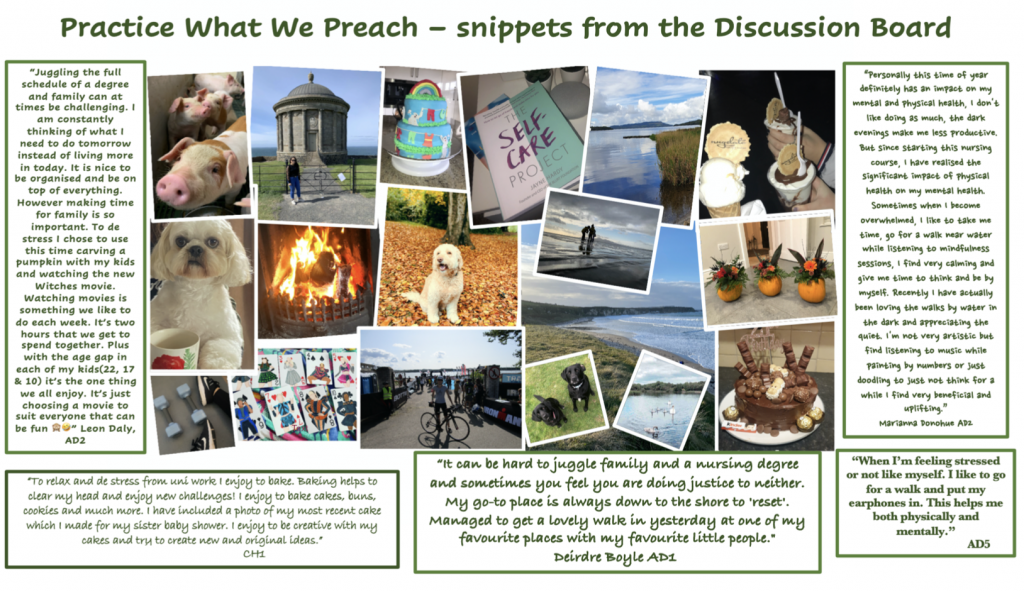In this post Karen Galway, Pauline McCarthy, Debbie Duncan and Aine Aventin (with contributions from the module teaching team and Sept ’19 nursing cohort) practice what they preach and reflect on an initiative to protect their own and their students mental health.
Picture the scene: It’s September 2020 and a second wave of Covid-19 pandemic has started impacting our health Service in Northern Ireland. Semester one of 2020/21 in the School of Nursing and Midwifery starts in a few short weeks. Our students face continued uncertainty about the future of their degree programme. Teaching is now online with students on campus for essential skills only. Whether the programme will follow the usual pattern of six weeks on campus and six weeks of placement is anyone’s guess.
Our brand new undergraduate nursing curriculum, developed pre-covid, rubber stamped by the Nursing and Midwifery Council, now needs fleshed out under totally new and by now, clichéd unprecedented circumstances. Learning curves are steep, tensions are high and energy is [at times] low.
One teaching team is focused on a new module; Working inter-professionally to improve mental health and wellbeing. This module isn’t presenting a new topic per se, but it presents a consolidated approach to teaching mental health to nursing students, during the toughest of times. With two Lecturers co-ordinating plus eight teaching staff, the module team must now place a new level of focus on mental health and wellbeing for all nursing specialties; adult, children’s, learning disability and mental health.
Week one focuses on models of mental health and wellbeing, stigma and discrimination along with self-care. We introduce mindfulness, self-care principles for nurses and an overview of how covid-19 may be impacting on nurses’ mental health. Week two considers social epidemiology and inequalities to address risk and protective factors for mental health and wellbeing. We also address communication skills and the basics of a mental state examination. Week three addresses issues related to self-harm and suicidal ideation and prevention. It’s challenging content, for lecturers and students alike, in challenging times, taught under challenging conditions.
We worry about how the students and the staff will manage the online environment. We worry about whether we will recognise who is struggling or indeed over identifying with the content. Beyond our self-care content, we also provide links to support, across the university and in the community and we consistently remind our students to reach out and to practice self-care.
Despite our efforts, there seems no easy way to maintain our connections to the students while we all get used to these new technologies and grapple with a new societal normal. Meanwhile three other modules are in full swing for these year two students. We are still groping about awkwardly with a lot of the processes such as developing a meaningful attendance monitoring policy. The timetable can feel brutal, with students and teaching staff online, in classes for up to 6 hours straight. Still ahead in our module specification is week four, focused on physical and mental health interactions, week five addressing trauma informed practice and adverse childhood experiences, with the final week explaining the symptoms of common mental health problems and an understanding of the stepped care model and other useful supportive responses.
Something about this feels very wrong. We are teaching the students about mental health and wellbeing in the middle of a pandemic, while expecting staff and students to perform as normal. In reality, nothing inside or outside of university life is feeling anything like normal.
Day one and week one involve shell shock and eye strain. The materials are well received but the challenge of online delivery intensifies. After two weeks of teaching at ‘business as usual’ pace, we stop to consider this rock of necessary progress against the hard place of exhaustion, frustration, worry and potential disengagement. We brainstorm on how to give ourselves and the students some space to breathe. Can we alter our timetabling? Can we switch live content to recorded content? Would that help? Can we provide adequate breaks and importantly can we identify students who are struggling?
A few actions were tabled and adjustments made to the format for week three. We decide to cut back screen time. In our mental wellbeing module we replace a live online tutorial with a self-care activity.
Students were notified that the two-hour session would now involve a discussion board, instead of a live session. We sent a simple request that the students go and “practice what we’ve been preaching”. The instructions were to take the time to do something to protect and maintain their mental wellbeing, to post a photo or video and comment about the activity on a discussion board. That amounted to a small concession to the Covid-teaching challenge, but it had a big impact.
Within 10 days the discussion generated 546 posts, 250+ photos of stunning autumn scenes, a variety of video clips, poetry, art, music, pet appreciation, baking and a huge amount of shared joy!

We can confirm that the Sept 19 students are a cohort of dog-lovers, walkers, runners, sports stars, artists, empathetic and caring parents, siblings, children, flat mates and all round philosophers. Contributions were authentic, honest and entertaining personal accounts of how each individual took care of their mental wellbeing, in two hours of me- time, designated for self-care. Reading and commenting on the joy of free time, downtime, the positivity and the creativity was more than a pleasure. It was addictive! Perhaps the discussion board felt like a surrogate for the missing sense of community that the pandemic has taken away. Perhaps it should not be surprising that such a simple idea was embraced in such complicated times.
Acknowledging student contributions
Sept ‘19 undegraduate nursing students: Leon Daly, Shannon Campbell, Cliodhna McIntryre, Marianna Donahue, Deirdre Boyle, Siobhan Duffy, Emma Shields, Chloe Truesdale, Edelle Brown, Caroline Devlin, Roisin McCann, Holly Brown, Megan Elloitt, Roisin Byrne, Orlagh Carson, Santina Campbell, Heather Gould, Caitlin Duffy, Grace Espie. Thanks for allowing us to share your discussion posts and photos.
It would be great to hear how you have managed your own mental health or that of your students since the beginning of the academic year. Comment below- or send us a photo!

This is a fantastic reflection on ‘letting go’ of conventions and norms for the betterment of wellbeing. The discussion posts were genuinely heart warming and it was great so see all the different ways people relax and unwind 🙂
What a lovely blog for a Friday morning! I really enjoyed hearing about how students manage well-being especially at such an unusual time. I can also sense the enjoyment that the teaching team got from this module – thank you!
Thanks to all for sharing. I really identify with many of the issues and points that have been presented and the challenges and indeed opportunities that the pandemic has brought. Important opportunities to stop and reflect on what we have been doing, why we do it and given the circumstances how we need to do things differently. I hope that we can take this learning forward in the future and deliver an event better education experience for all our students.
Great to hear how this team are authentic champions of mental wellbeing within our school and take to heart the old proverb, ‘physician heal thyself’. It’s wonderful to know that we can all support each other, to take the best out of these trying times and find the silver lining in the Covid cloud. Thank you all – I’m on to it and will use my few days off next week to connect with nature instead of a device!
Great to hear how this team are authentic champions of mental wellbeing within our school and take to heart the old proverb, ‘physician heal thyself’. It’s wonderful to know that we can all support each other, to take the best out of these trying times and find the silver lining in the Covid cloud. Thank you all – I’m on to it and will use my few days off next week to connect with nature instead of a device!
What an excellent way of creating space in the curriculum for self care and supporting students and staff in experiencing the benefit of looking after ourselves so we can better look after others! Thank you so much for sharing! I will be certainly using these ideas!!
Thank you for sharing this. It is great to see the collaboration between students and staff. It is so good to see mental heath getting the focus it needs. If I can acknowledge my own mental health needs, I am better placed to recognise this need in others, those I work with and care for. I love a walk in the forest or by the sea, a chat with a friend. Time in the gym helps me to leave it all behind, a place where no one asks anything of me, time for me.
I have read your blog again this morning – this time in a quieter environment, with placement four completed, NIPAD signed off and a start made to my assignments. Anticipation of Christmas approaching is beginning to replace the anxiety of all that has been undone, or half done, or will never to be done again.
This Christmas will be a memorable one. At times due of the pain of family members unable to travel home, and this morning, presents for a new grandchild being removed from under our tree and hurriedly parceled up for posting overseas. We have learned a lot in 2020 about what is really important to us. We have invented new ways to satisfy our need to connect with absent loved ones, friends and work colleagues, teachers and students. Our new-found resilience will see us through, so I know this Christmas will be memorable too, for the joy and happiness we will send and receive thanks to a medium many of us have shunned in the past.
‘Practicing what we preach’ was yet another example of how we have learned to prioritise, and care for ourselves and others. Sometimes we forget until it is too late, so thank you for reminding us.
Merry Christmas,
Eddie
Hi Eddie, So lovely to read your reply, eventually, on the rainiest Feb morning yet! It’s can be a struggle to keep the chin up, positive vibes are so important. Thank you for helping to unearth some lovely Christmas memories and force them to linger for the greater good 🙂 Soon we will have longer evenings to enjoy. More time to get out there into the fresh air. Until then, stay warm and enjoy the coziness of winter. Hoping the Feb cohort will enjoy the module and looking forward to kicking off next week! Wish us luck.
Karen